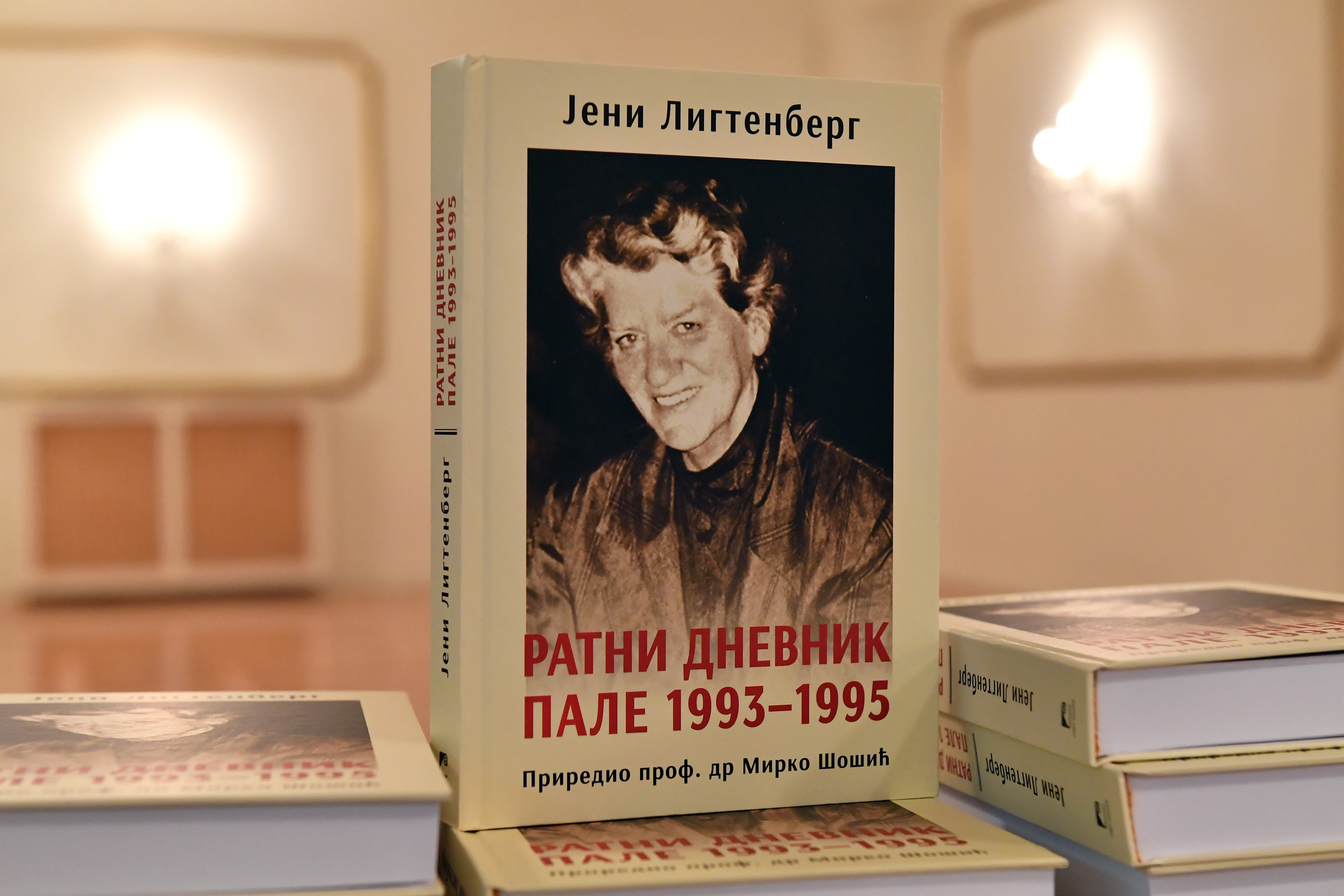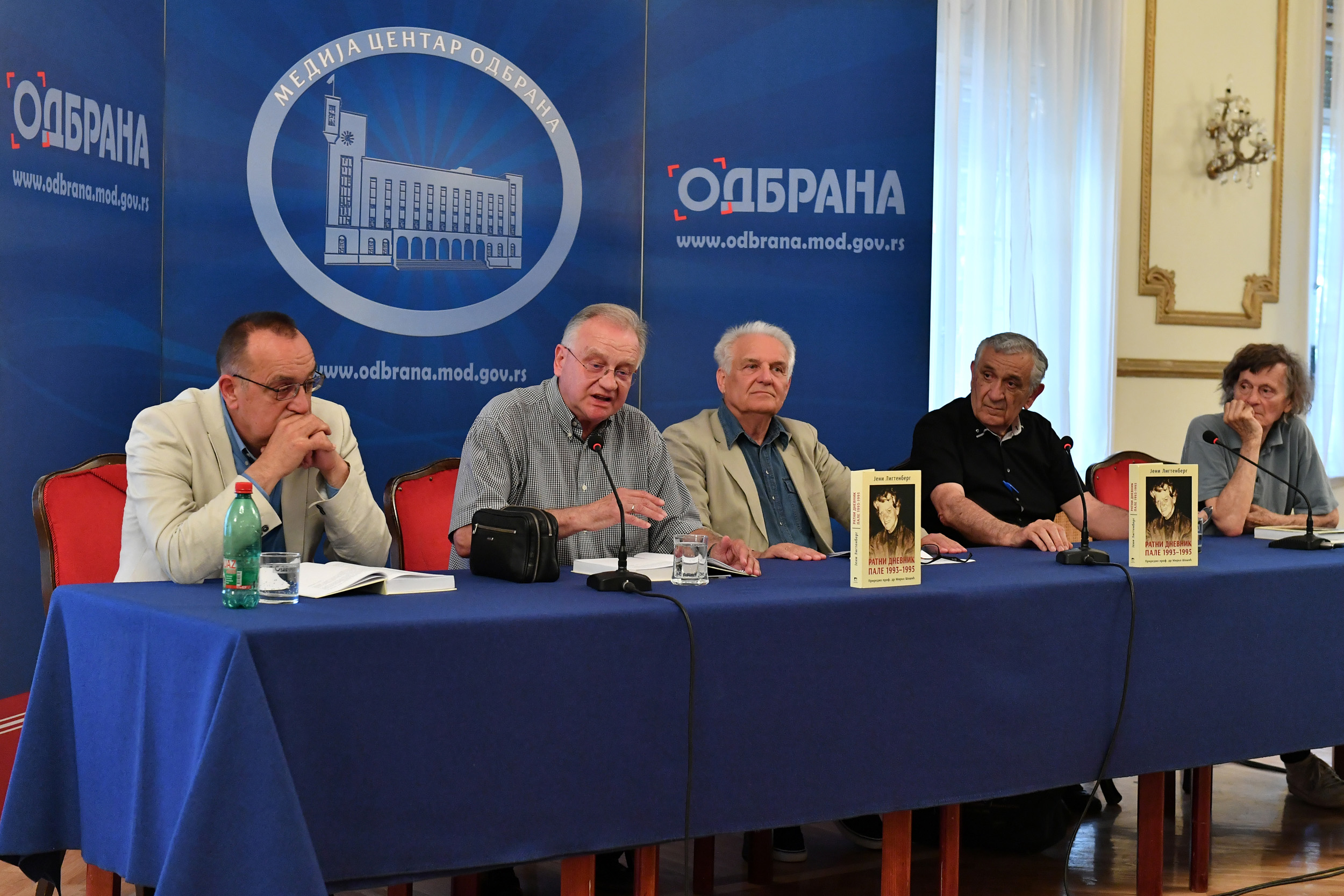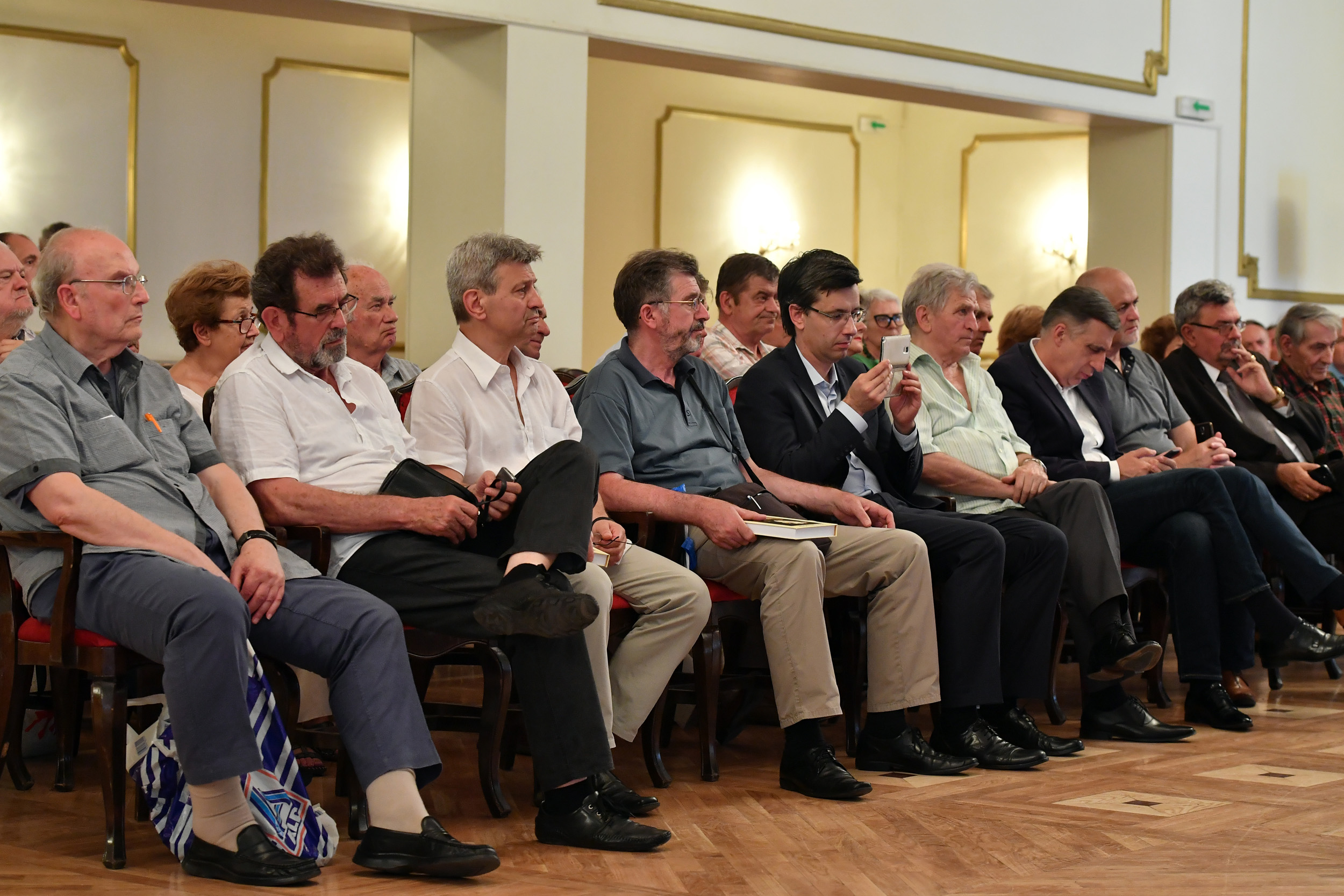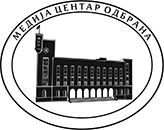14.06.2017
The War Journal by Jenny Ligtenberg Promoted
 Today, in the Serbian Armed Forces Club, the Publishing Society “Book World” presented a work by Jenny Ligtenberg, “The War Journal of Pale 1993-1995” edited by Prof Mirko Šošić. The significance of this work primarily rests on the authenticity and documentary weight, since it is a testimony written from a perspective of a foreigner – a Dutch pharmacist Jenny Ligtenberg, who as unbiased source, during her work in Bosnia and HHerzegovina engulfed by the war, realised that Serbs were the victims of propaganda of Western media and politicians, unjustly blamed as the sole nation responsible for the war and presented to the world as barbarians. With the intention to help the afflicted population and to see for herself whether the things said about the conflicted sides were true or not, Jenny, leaving her family behind, her home, friends and comfort, came from the Netherlands to B&H for three months, only to stay there for three years dedicating all her work to revealing the truth and appealing to the actors in international politics to right the injustice done to Serbs.
Today, in the Serbian Armed Forces Club, the Publishing Society “Book World” presented a work by Jenny Ligtenberg, “The War Journal of Pale 1993-1995” edited by Prof Mirko Šošić. The significance of this work primarily rests on the authenticity and documentary weight, since it is a testimony written from a perspective of a foreigner – a Dutch pharmacist Jenny Ligtenberg, who as unbiased source, during her work in Bosnia and HHerzegovina engulfed by the war, realised that Serbs were the victims of propaganda of Western media and politicians, unjustly blamed as the sole nation responsible for the war and presented to the world as barbarians. With the intention to help the afflicted population and to see for herself whether the things said about the conflicted sides were true or not, Jenny, leaving her family behind, her home, friends and comfort, came from the Netherlands to B&H for three months, only to stay there for three years dedicating all her work to revealing the truth and appealing to the actors in international politics to right the injustice done to Serbs.Then Minister of Health in the Government of the Republic of Srpska, Dr Dragan Kalinić, refers to several levels of the perception contained in the Jenny’s War Journal.
 - The first one is her relationship with the families with whom she initially stayed. [...] She noticed, and it is the sentence from her book which explains here perception of Serbs, that “Serbs possess immense will power. They complained a little or not at all, they adapt well to their faith, and still remain marry”. The second part of her observation refers to the War hospital “Koran” and her authentic story about self-sacrificing care for the ill and wounded, regardless of their faith and nationality. [...]The third part is extremely important. It, apart from human, authentic and dramatic medical stories from the very hospital, speaks about the behaviour of international community towards Serbs. As early as at that moment, Jenny managed to perceive the reasons for the breakup of Yugoslavia, and in a prophet-like manner pointed out to what is happening today in the region and the world, particularly the to the conflict between the East and West in a disoriented Europe, and for the first time she spoke about the basis of the Islamic fundamentalism. [...] And just like it was once the case with Archibald Reiss, we have learned more through Jenny about ourselves and our virtues and flaws, and that is why this book has in itself a remedy for our life and future, but above all it contains one magnificent and deeply humane massage that Serbs, just like all other nations, are the God’s children and discriminating them in relation to the others is an act of blasphemy.
- The first one is her relationship with the families with whom she initially stayed. [...] She noticed, and it is the sentence from her book which explains here perception of Serbs, that “Serbs possess immense will power. They complained a little or not at all, they adapt well to their faith, and still remain marry”. The second part of her observation refers to the War hospital “Koran” and her authentic story about self-sacrificing care for the ill and wounded, regardless of their faith and nationality. [...]The third part is extremely important. It, apart from human, authentic and dramatic medical stories from the very hospital, speaks about the behaviour of international community towards Serbs. As early as at that moment, Jenny managed to perceive the reasons for the breakup of Yugoslavia, and in a prophet-like manner pointed out to what is happening today in the region and the world, particularly the to the conflict between the East and West in a disoriented Europe, and for the first time she spoke about the basis of the Islamic fundamentalism. [...] And just like it was once the case with Archibald Reiss, we have learned more through Jenny about ourselves and our virtues and flaws, and that is why this book has in itself a remedy for our life and future, but above all it contains one magnificent and deeply humane massage that Serbs, just like all other nations, are the God’s children and discriminating them in relation to the others is an act of blasphemy.The Minister for Religion of the Republic of Srpska of the time, Dragan Davidović, draw the attention to Jenny not only as a pharmacist who “piled and issued drugs”, but as a person who had a serious task with her Serbian colleagues, to eliminate unusable donated medical supplies and to find a small grain among them that could be used.
Professor Dr Dragan Letić characterised her book as a memorial candle which 23 years ago Jenny wanted to use to bring a trace of light into the dark of great powers politics of the time.
 - Whoever reads this book will feel closeness to it, since it simply absorbs with its humanity, understanding. [...] Jenny intended her testimony for the future generations, since, as she claims, it is certain that “the truth will be out sooner or later, and she will not nor cannot hide the truth.” It is because of the truth that she decided to come to Pale and take a peek “behind the scene” and the world political show for the public. Pharmacist by vocation, she precisely noted every information, and that is why her Journal has the force of a document, first of all because of the notes stating the day, month, year, location of the war action in question, then the names of healthcare workers, surgeons and all the interventions and type of injury and the number of survived and dead and the constant lack of medicines. She used to get angry with journalists who tendentiously made their reports, sitting in their studios pretending to be on the battlefield. I quote: “Later I read a journal of a Dutch reporter and I conclude that she was lazily watching the “CNN” headlines from her chair in Belgrade and thus made her reports. Such people follow the scent of money and they are prejudiced, serving the Western public their poison against Serbs. For them, the tendentious journalists, Serbs were a scapegoat for all the misery. They were accused for Markale immediately after the explosion, before initial expert assessment”. In such policy of one-sided reporting Jenny recognises that the Western politics had only one goal, to commit genocide primarily against Bosnian Serbs, since they should disappear from the face of the earth. Embittered by hypocritical politics she wrote: “I only wish to expose the United Nations and to say the real truth to the world into its face”. She opposed the tendentious writing with objective reporting and indisputable facts. She wrote, although in vain, to her Prime Minister, Van Den Brook: “Now, when we are here” she refers to the Dutch members of UNPROFOR with whom she often exchanged experiences, “we see the real truth which is different to the one presented to us by the Western media”. She wrote to Clinton, Jimmy Carter, Van Den Brook, various magazines and newspapers, but without success.
- Whoever reads this book will feel closeness to it, since it simply absorbs with its humanity, understanding. [...] Jenny intended her testimony for the future generations, since, as she claims, it is certain that “the truth will be out sooner or later, and she will not nor cannot hide the truth.” It is because of the truth that she decided to come to Pale and take a peek “behind the scene” and the world political show for the public. Pharmacist by vocation, she precisely noted every information, and that is why her Journal has the force of a document, first of all because of the notes stating the day, month, year, location of the war action in question, then the names of healthcare workers, surgeons and all the interventions and type of injury and the number of survived and dead and the constant lack of medicines. She used to get angry with journalists who tendentiously made their reports, sitting in their studios pretending to be on the battlefield. I quote: “Later I read a journal of a Dutch reporter and I conclude that she was lazily watching the “CNN” headlines from her chair in Belgrade and thus made her reports. Such people follow the scent of money and they are prejudiced, serving the Western public their poison against Serbs. For them, the tendentious journalists, Serbs were a scapegoat for all the misery. They were accused for Markale immediately after the explosion, before initial expert assessment”. In such policy of one-sided reporting Jenny recognises that the Western politics had only one goal, to commit genocide primarily against Bosnian Serbs, since they should disappear from the face of the earth. Embittered by hypocritical politics she wrote: “I only wish to expose the United Nations and to say the real truth to the world into its face”. She opposed the tendentious writing with objective reporting and indisputable facts. She wrote, although in vain, to her Prime Minister, Van Den Brook: “Now, when we are here” she refers to the Dutch members of UNPROFOR with whom she often exchanged experiences, “we see the real truth which is different to the one presented to us by the Western media”. She wrote to Clinton, Jimmy Carter, Van Den Brook, various magazines and newspapers, but without success. Boro Drašković believes that the Jenny Ligtenberg’s book “craves” that a film is made after it and it deserves to be translated in Russian and English languages, so that the truth can travel the world. The editor of the issue, Prof Dr Mirko Šošić in his address tried to present Jenny as a person who because of her courage to tell the truth and her honour to fight for the truth, deserves our respect, just like those heroines from the First and Second World War, whose help Serbian people remembers until this very day. Dr Šošić, once the Minister of Health in Republic of Srpska, particularly looked back on some events in which he participated together with Jenny, depicting this Dutchwoman as a self-sacrificing person who gave all her pension and all that she had, in a time of poverty and temptation, and philanthropically shared all with the wounded, colleagues and families with whom she stayed.
Boro Drašković believes that the Jenny Ligtenberg’s book “craves” that a film is made after it and it deserves to be translated in Russian and English languages, so that the truth can travel the world. The editor of the issue, Prof Dr Mirko Šošić in his address tried to present Jenny as a person who because of her courage to tell the truth and her honour to fight for the truth, deserves our respect, just like those heroines from the First and Second World War, whose help Serbian people remembers until this very day. Dr Šošić, once the Minister of Health in Republic of Srpska, particularly looked back on some events in which he participated together with Jenny, depicting this Dutchwoman as a self-sacrificing person who gave all her pension and all that she had, in a time of poverty and temptation, and philanthropically shared all with the wounded, colleagues and families with whom she stayed.
